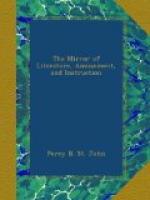The critical pen of Mrs. Inchbald justly remarks, “To the honour of a profession long held in contempt by the wise—and still contemned by the weak—Shakspeare, the pride of Britain, was a player.” To the illustrious bard, the modern drama is indebted for its excellence. His writings will remain for ever the grandest monument of a genius which opened to him the whole heart of man, all the mines of fancy, all the stores of nature, and gave him power beyond all other writers, to move, astonish, and delight mankind. In the drama, the most interesting emotions are excited; the dangerous passions of hate, envy, avarice, and pride, with all their innumerable train of attendant vices, are detected and exposed. Love, friendship, gratitude, and all those active and generous virtues which warm the heart and exalt the mind, are held up as objects of emulation. And what can be a more effectual method of softening the ferocity, and improving the minds of the inconsiderate? The heart is melted by the scene, and ready to receive an impression—either to warn the innocent, or to appal the guilty; and numbers of those who have neither abilities nor time for deriving advantage from reading, are powerfully impressed through the medium of the eyes and ears, with those important truths which while they illuminate the understanding, correct the heart. The moral laws of the drama are said to have an effect next after those conveyed from the pulpit, or promulgated in courts of justice. Mr. Burke, indeed, has gone so far as to observe that “the theatre is a better school of moral sentiment than churches.” The drama, therefore, has a right to find a place; and to its professors are we indebted for what may justly be considered one of the highest of all intellectual gratifications.
F.K.Y.
* * * * *
MEMORY.
(For the Mirror.)
How many a mortal bears a heavy chain,
Of bitter sorrow, ’neath thy iron
reign,
And many a one, whose harder fate has
given,
Some early woes, by thee to madness driven,
Sees the sad vision of some bygone day,
And thinks on what he hath seen with dismay:
So some lone murderer, wanders o’er
the world
By thy dread arm to desperation hurl’d;




